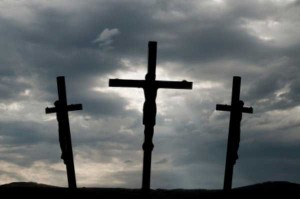Vatican City, 25 April 2012 (VIS) – If prayer and the Word of God do not nourish our spiritual life, we run the risk being
suffocated by the many cares and concerns of daily existence. Prayer makes us see reality with new eyes and helps us to find our way in the midst of adversity. These words were pronounced by Benedict XVI in his catechesis during this morning’s general audience, held in St. Peter’s Square in the presence of more than 20,000 faithful.
The Pope explained how prayer encouraged the early Church, though beset by difficulties, and how it can help man to live a better life today. “Ever since the beginning of her journey the Church has had to face unexpected situations, new questions and emergencies, to which she has sought to respond in the light of the faith, allowing herself to be guided by the Holy Spirit”, he said.
This was already evident at the time of the Apostles. In the Acts, Luke the Evangelist recounts “a serious problem which the first Christian community in Jerusalem had to face and resolve, … concerning the pastoral care of charity towards the isolated and the needy. It was not an unimportant issue and risked creating divisions within the Church. … What stands out is that, at that moment of pastoral emergency, the Apostles made a distinction. Their primary duty was to announce the Word of God according to the Lord’s mandate, but they considered as equally serious the task of … making loving provision for their brothers and sisters in situations of need, in order to respond to Jesus’ command: love one another as I have loved you”.
The Apostles made a clear decision: it was not right for them to neglect prayer and preaching, therefore “seven men of good standing were chosen, the Apostles prayed for the strength of the Holy Spirit, then laid their hands upon them that they might dedicate themselves to the diaconate of charity”.
This decision, the Pope explained, “shows the priority we must give to God and to our relationship with Him in prayer, both as individuals and in the community. If we do not have the capacity to pause and listen to the Lord, to enter into dialogue with Him, we risk becoming ineffectually agitated by problems, difficulties and needs, even those of an ecclesial and pastoral nature”.
prayer
Pope Benedict on Prayer 26 – Fear Not Persecutions But Trust In The Presence of God
Vatican City, 18 April 2012 (VIS) – Returning to a recent series of catecheses on the theme of prayer, Benedict XVI dedicated his general audience this morning to what has been called the “Little Pentecost”, an event which coincided with a difficult moment in the life of the nascent Church.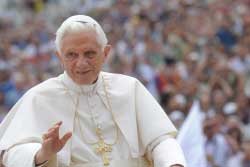
The Acts of the Apostles tell us how Peter and John were released from prison following their arrest for preaching the Gospel. They returned to their companions who, listening to their account of what had happened, did not reflect on how to react or defend themselves, or on what measures to adopt; rather, “in that moment of trial they all raised their voices together to God”, Who replied by sending the Holy Spirit.
“This was the unanimous and united prayer of the whole community, which was facing persecution because of Jesus”, the Pope explained. It involved the community “because the experiences of the two Apostles did not concern only them, but the entire Church. In suffering persecution for Jesus’ sake, the community not only did not give way to fear and division, but was profoundly united in prayer”.
When believers suffer for the faith, “unity is consolidated rather than undermined, because it is supported by unshakeable prayer. The Church must not fear the persecutions she is forced to suffer in her history, but must trust always, as Jesus did in Gethsemane, in the presence, help and strength of God, invoked in prayer”.
Before trying to understand what had happened the first community sought to interpret events through the faith, using the Word of God. In the Acts of the Apostles St. Luke notes how the community of Jerusalem began by invoking God’s greatness and immensity. Then, using the Psalms, those early Christians recalled how God had acted in history alongside His people, “showing Himself to be a God Who is concerned for human beings, Who does not abandon them”, Benedict XVI said. Subsequently the events were read “in the light of Christ, Who is the key to understanding all things, even persecution. The opposition to Jesus, His passion and death were reread … as the accomplishment of the plan of God the Father for the salvation of the world. … In prayer, meditating on Sacred Scripture in the light of the mystery of Christ helps us to interpret current reality as part of the history of salvation which God enacts in the world”.
Thus the plea the first Christian community of Jerusalem made to God in prayer was not “to be defended, to be spared from trials or to enjoy success, but only to be able to proclaim … the Word of God frankly, freely and courageously”. The community also asked that “their proclamation be accompanied by the hand of God so that healing, signs and wonders could be accomplished. In other words, they wanted to become a force for the transformation of reality, changing the hearts, minds and lives of men and bringing the radical novelty of the Gospel”.
“We too”, the Holy Father concluded his catechesis, “must bring the events of our daily lives into our prayer, in order to seek their most profound significance. And we too, like the first Christian community, allowing ourselves to be illuminated by the Word of God and meditating on Sacred Scripture, may learn to see that God is present in our lives, even at moments of difficulty, and that everything … is part of a plan of love in which the final victory over evil, sin and death is truly is that of goodness, grace, life and God”.
Pope Benedict on Prayer 25 – Venerating the Mother of God Means Learning to Become a Community of Prayer
Vatican City, 14 March 2012 (VIS)– During his general audience this morning the Holy Father began a new cycle ofcatecheses, dedicated to the subject of prayer in the Acts of the Apostles and the Letters of St. Paul. The Pope focused his remarks today on the figure of Mary as she appears in the Acts, when with the Apostles she awaits the coming of the Holy Spirit.Benedict XVI told the more than 10,000 pilgrims gathered in St. Peter’s Square that “it was with Mary that Jesus’ earthly life began, and it was with her that the Church took its first steps. … She discreetly followed her Son’s journey during His public life, even unto the foot of the cross. Then, with silent prayer, she continued to follow the progress of the Church”, he explained.The stages of Mary’s own journey from the house of Nazareth to the Upper Room of Jerusalem “were marked by her capacity to maintain an ongoing state of contemplation, meditating upon each event in the silence of her heart, before God. The Mother of God’s presence with the Eleven after the Ascension … has great significance because with them she shared the most precious of things: the living memory of Jesus in prayer”.After Jesus’ Ascension to heaven, the Apostles met with Mary to await the gift of the Holy Spirit, without which it is not possible to bear witness to Christ. “She, who had already received the Spirit in order to generate the incarnate Word, shared the entire Church’s expectation of the same gift. … If it is true that there could be no Church without Pentecost, it is also true that there could have been no Pentecost without the Mother of Jesus, because she had a unique knowledge of what the Church experiences every day by the action of the Holy Spirit”.
The Pope went on to recall how the Vatican Council II Dogmatic Constitution “Lumen gentium” had emphasised this special relationship between the Virgin and the Church. “We see the Apostles before the day of Pentecost ‘constantly devoting themselves to prayer, together with certain women including Mary the mother of Jesus'”, he said. “Mary’s place is in the Church, ‘wherefore she is hailed as a pre-eminent and singular member, … and as its type and excellent exemplar in faith and charity’.
“Venerating the Mother of Jesus in the Church means, then, learning from her how to become a community of prayer“, the Holy Father added. “This is one of the essential aspects of the first description of the Christian community given in the Acts of the Apostles”.
Our prayers “are often dictated by difficult situations, by personal problems which cause us to turn to the Lord in search of light, comfort and aid. But Mary invites us to open prayer to other dimensions, to address God not only in moments of need and not only for ourselves, but unanimously, perseveringly, faithfully and with ‘one heart and soul'”.
Benedict XVI also pointed out that Mary “was placed by the Lord at decisive moments of the history of salvation, and she always responded with complete readiness as a result of her profound bond with God matured through assiduous and intense prayer. … Between the Ascension and Pentecost, she was ‘with’ and ‘in’ the Church, in prayer. Mother of God and Mother of the Church, Mary exercises her maternity until the end of history”.
The Pope concluded by saying that “Mary teaches us the need for prayer and shows us how only through a constant, intimate and complete bond of love with her Son can we courageously leave our homes … to announce the Lord Jesus, Saviour of the world”.
What is “Eternal Life”? How does this understanding affect our prayer? Reflections by Msgr. John Esseff – Discerning Hearts
Podcast: Play in new window | Download (Duration: 49:33 — 79.4MB) | Embed
Subscribe: Apple Podcasts | Spotify | Amazon Music | Android | Pandora | iHeartRadio | JioSaavn | Podchaser | Gaana | Podcast Index | Email | TuneIn | Deezer | Anghami | RSS | More
What is “Eternal Life” and why is it so important for us to understand and live it’s meaning?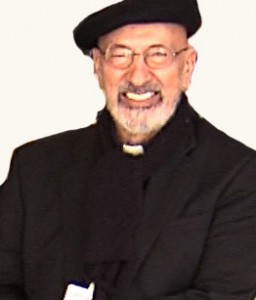 Msgr. Esseff breaks open the “magnificent” Chapter 17 of John’s Gospel. He helps us to understand the “eternal” prayer of the heart of Jesus. How does this affect our prayer, especially in our appreciation of “contemplative”
Msgr. Esseff breaks open the “magnificent” Chapter 17 of John’s Gospel. He helps us to understand the “eternal” prayer of the heart of Jesus. How does this affect our prayer, especially in our appreciation of “contemplative”  prayer and contemplation? How does this affect our understanding of “time”? Msgr. Esseff discusses Purgatory in a way that takes this into account. What is death in this world? What is true life in this world?
prayer and contemplation? How does this affect our understanding of “time”? Msgr. Esseff discusses Purgatory in a way that takes this into account. What is death in this world? What is true life in this world?
Be sure to visit Msgr. Esseff’s website : “Building a Kingdom of Love”
Pope Benedict on Prayer 24 – Silence is Indispensable for Prayer
Vatican City, 7 March 2012 (VIS) – During his general audience this morning Benedict XVI concluded a series of catecheses dedicated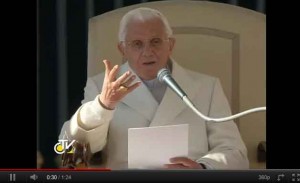 to the prayer of Jesus. Today he turned his attention to the theme of alternating words and silence which characterised Christ’s earthly life, above all on the Cross, and which is also significant in two aspects of our own lives.
to the prayer of Jesus. Today he turned his attention to the theme of alternating words and silence which characterised Christ’s earthly life, above all on the Cross, and which is also significant in two aspects of our own lives.
“This principle”, the Holy Father went on, “holds true for individual prayer, but also for our liturgies which, to facilitate authentic listening, must also be rich in moments of silence and of non verbal acceptance. … Silence has the capacity to open a space in our inner being, a space in which God can dwell, which can ensure that His Word remains within us, and that love for Him is rooted in our minds and hearts, and animates our lives”.
 The Pope then turned to focus on the second important aspect of the relationship between silence and prayer. “In our prayers”, he said, “we often find ourselves facing the silence of God. We almost experience a sense of abandonment; it seems that God does not listen and does not respond. But this silence, as happened to Jesus, does not signify absence. Christians know that the Lord is present and listens, even in moments of darkness and pain, of rejection and solitude. Jesus assures His disciples and each one of us that God is well aware of our needs at every moment of our lives”.
The Pope then turned to focus on the second important aspect of the relationship between silence and prayer. “In our prayers”, he said, “we often find ourselves facing the silence of God. We almost experience a sense of abandonment; it seems that God does not listen and does not respond. But this silence, as happened to Jesus, does not signify absence. Christians know that the Lord is present and listens, even in moments of darkness and pain, of rejection and solitude. Jesus assures His disciples and each one of us that God is well aware of our needs at every moment of our lives”.
“For us, who are so frequently concerned with operational effectiveness and with the results … we achieve, the prayer of Jesus is a reminder that we need to stop, to experience moments of intimacy with God, ‘detaching ourselves’ from the turmoil of daily life in order to listen, to return to the ‘root’ which nourishes and sustains our existence. One of the most beautiful moments of Jesus’ prayer is when, faced with the sickness, discomfort and limitations of his interlocutors, He addresses His Father in prayer, thus showing those around him where they must go to seek the source of hope and salvation”.
Christ touches the most profound point of His prayer to the Father at the moment of His passion and death, Pope Benedict said. And citing the Catechism of the Catholic Church he concluded by noting that “His cry to the Father from the cross encapsulated ‘all the troubles, for all time, of humanity enslaved by sin and death, all the petitions and intercessions of salvation history are summed up in this cry of the incarnate Word. Here the Father accepts them and, beyond all hope, answers them by raising His Son. Thus is fulfilled and brought to completion the drama of prayer in the economy of creation and salvation'”.
IP#139 Paula Huston – Simplifying Your Soul on Inside the Pages
Podcast: Play in new window | Download (Duration: 27:41 — 44.3MB) | Embed
Subscribe: Apple Podcasts | Spotify | Amazon Music | Android | Pandora | iHeartRadio | JioSaavn | Podchaser | Gaana | Podcast Index | Email | TuneIn | Deezer | Anghami | RSS | More
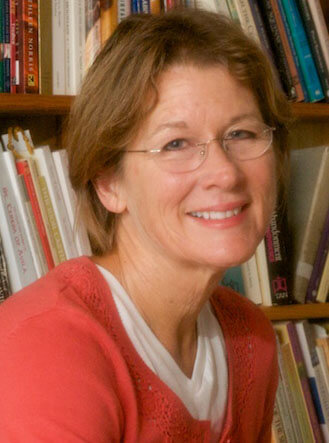
Here is the book for Lent (and any other time of the year for that matter), “Simplifying Your Soul: Lenten Practices to Renew Your Spirit” is “simply” wonderful! Paula Huston has such a gentle way of helping us to penetrate into what our hearts so we can draw closer to what we truly long for…a deeper relationship with God…the Father, the Son, and the Holy Spirit. A Benedictine oblate, Paula, draws from the best of the monastic traditions and helps us to apply those practices in our modern day circumstances. I have to believe that Sts. Benedict and Scholastic would be overjoyed how this 21-century daughter of the church has responded to their initial teachings offered so a long ago. NOT TO BE MISSED…HIGHLY RECOMMENDED!
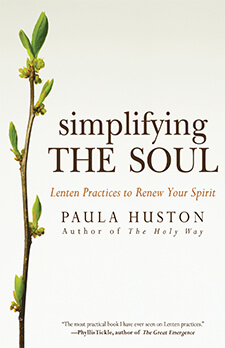 You can find it here
You can find it here
From the book description:
Our temptation in this era of self-fulfillment is to dismiss humility as a relic of the unsophisticated past. Yet for centuries, Christians have considered it a key component of a healthy spiritual life, and the journey toward humility to be one and the same as the journey toward Christlikeness.
The beauty of the Lenten season is that it encourages the development of a humble heart. Structured as an individual Lenten retreat, Simplifying the Soul presents daily readings from Jesus and the desert fathers and mothers, along with a meditation focused on a specific activity that can be carried out that day. Many of these activities come straight out of Catholic tradition, but others are adaptations of old wisdom woven into contemporary life (cleaning out a junk drawer, walking instead of driving, etc.) All are designed to lead to conversion of heart and a transformed life.
“Teach Us How To Pray” – A series on prayer with Msgr. John Esseff Episode 3 – Morning Prayer – Discerning Hearts
Podcast: Play in new window | Download (Duration: 34:57 — 56.0MB) | Embed
Subscribe: Apple Podcasts | Spotify | Amazon Music | Android | Pandora | iHeartRadio | JioSaavn | Podchaser | Gaana | Podcast Index | Email | TuneIn | Deezer | Anghami | RSS | More
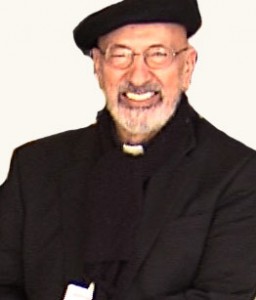 Msgr. Esseff teaches the importance of the Liturgy of Hours. He breaks open each portion of Morning Prayer. The Hymn, the psalm, the canticle, again the psalm … we sing praise to God with this section of Morning Prayer. Then God speaks to us in the reading. Then we respond to
Msgr. Esseff teaches the importance of the Liturgy of Hours. He breaks open each portion of Morning Prayer. The Hymn, the psalm, the canticle, again the psalm … we sing praise to God with this section of Morning Prayer. Then God speaks to us in the reading. Then we respond to  with the a short psalm. Then he helps us to appreciate the power of the Benedictus. That is followed by the intentions of the Church. Concluding with the great Our Father. We then bless the Lord and give Him thanks. Jesus unites the world in our prayer of praise to the Father when we enter into the Divine Office.
with the a short psalm. Then he helps us to appreciate the power of the Benedictus. That is followed by the intentions of the Church. Concluding with the great Our Father. We then bless the Lord and give Him thanks. Jesus unites the world in our prayer of praise to the Father when we enter into the Divine Office.
Be sure to visit Msgr. Esseff’s website “Building A Kingdom of Love”
Pray the Liturgy of Hours
Pope Benedict on Prayer 23 – We never fall from God’s embrace
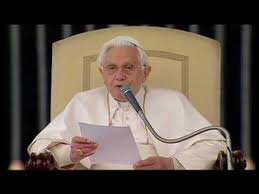 Vatican City, 15 February 2012 Vatican Radio-
Vatican City, 15 February 2012 Vatican Radio-
In his catechesis in Italian, to a packed Paul VI audience hall, the Holy Father said “In our school of prayer last week I spoke about Christ’s prayer on the Cross, taken from Psalm 22 “My God, my God why have you forsaken me”. Now I would like to continue to meditate on the prayers of Jesus on the cross in the imminence of death and today I would like to focus on the narrative that we encounter in the Gospel of St. Luke. The Evangelist has handed down three words of Jesus on the cross, two of which – the first and third – are explicitly prayers to the Father. The second one consists of the promise made to the so-called good thief crucified with him, answering, in fact, the thief’s prayer, Jesus reassures him: “Truly I tell you today will be with me in Paradise” (Lk 23 , 43). The two prayers of the dying Jesus and the acceptance of the repentant sinner’s supplication to Him are suggestively entwined in Luke’s account. Jesus both prays to the Father and hears the prayer of this man who is often called latro poenitens, “the repentant thief.”
Let us dwell on these three prayers of Jesus. The first pronounced immediately after being nailed to the cross, while the soldiers are dividing his garments as sad reward of their service. In a way this gesture closes the process of crucifixion. St. Luke writes: “When they came to the place called the Skull, they crucified him and the criminals there, one on his right, the other on his left. [Then Jesus said, “Father, forgive them, they know not what they do.”] They divided his garments by casting lots “(23.33 to 34). The first prayer that Jesus addresses to the Father is one of intercession: He asks forgiveness for his executioners. With this, Jesus in person carries out what he had taught in the Sermon on the Mount when he said: ” But to you who hear I say, love your enemies, do good to those who hate you ” (Lk 6:27) and also promised to those who can forgive, “then your reward will be great and you will be children of the Most High ” (v. 35). Now, from the cross, He not only forgives his executioners, but speaks directly to the Father interceding on their behalf.
This is attitude of Jesus’ finds a moving ‘imitation’ in the story of the stoning of St. Stephen, the first martyr. Stephen, in fact, coming to an end, “knelt down and cried with a loud voice:” Lord, do not hold this sin against them”. That said, he died “(Acts 7.60). It was his last word. The comparison of the prayer for forgiveness of Jesus and that of the martyr is significant. Stephen turns to the Risen Lord and calls for his murder – a gesture clearly defined by the expression “this sin” – is not imputed against those who stone him. Jesus addresses the Father on the cross and not only asks for forgiveness for his executioners, but also offers a reading of what is happening. In his words, in fact, the men who crucify him “know not what they do” (Luke 23:34). He gives that ignorance, “not knowing” as the reason for the request for forgiveness from the Father, for this ignorance leaves the way open to conversion, as is the case in the words that the centurion spoke at Jesus’ death: ” This man was innocent beyond doubt”(v. 47), he was the Son of God”. It is a consolation for all times and for all men that the Lord, both for those who really did not know – the killers – and those who knew and condemned him, gives ignorance as the reason for asking for forgiveness – he sees it as a door that can open us up to
repentance “(Jesus of Nazareth, II, 233).
The second prayer of Jesus on the cross as told by St. Luke is a word of hope, is His answer to the prayer of one of the two men crucified with Him. The good thief before Jesus returned to himself and repents, he feels himself to be before the Son of God, who reveals the Face of God, and prays: “Jesus, remember me when you come into your kingdom” (v. 42). The Lord’s answer to this prayer goes far beyond the supplication, he says: ” Amen, I say to you, today you will be with me in Paradise” (v. 43). Jesus is aware of entering directly into communion with the Father and of reopening the path for the man to God’s paradise. So through this response gives the firm hope that the goodness of God can touch us even at the last moment of life and that sincere prayer, even after a life of wrong, meets the open arms of the good Father who awaits the return of his son.
“no matter how hard the trial, difficult the problem, heavy the suffering, we never fall from the hands of God”
“Teach Us How To Pray” – A series on prayer with Msgr. John Esseff Episode 2 – The Psalms and Prayer – Discerning Hearts
Podcast: Play in new window | Download (Duration: 54:13 — 86.9MB) | Embed
Subscribe: Apple Podcasts | Spotify | Amazon Music | Android | Pandora | iHeartRadio | JioSaavn | Podchaser | Gaana | Podcast Index | Email | TuneIn | Deezer | Anghami | RSS | More
Msgr. Esseff offers his second lesson in “Teach Us How To Pray”.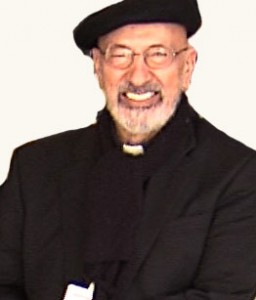 He speaks of the importance of Morning and Evening prayers in our lives. The Holy Spirit inspires us to pray and the Church teaches prayer through the Liturgy of the Hours.
He speaks of the importance of Morning and Evening prayers in our lives. The Holy Spirit inspires us to pray and the Church teaches prayer through the Liturgy of the Hours.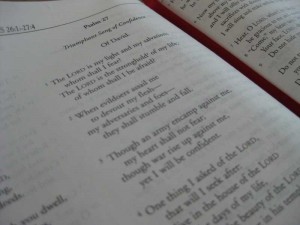 Msgr. Esseff goes on to teach on the Psalms. Those who pray the psalms offer powerful praise to the Father. Who actually praises? In the deepest level of our heart, it’s actually Jesus who praises the Father in us when we pray the Psalms and the Father loves us in return. What is essential is that we listen to what God says to us in prayer…Listen.
Msgr. Esseff goes on to teach on the Psalms. Those who pray the psalms offer powerful praise to the Father. Who actually praises? In the deepest level of our heart, it’s actually Jesus who praises the Father in us when we pray the Psalms and the Father loves us in return. What is essential is that we listen to what God says to us in prayer…Listen.
Pray the Liturgy of Hours
“Teach Us How To Pray” – A series on prayer with Msgr. John Esseff Episode 1 – Discerning Hearts
Podcast: Play in new window | Download (Duration: 42:45 — 68.5MB) | Embed
Subscribe: Apple Podcasts | Spotify | Amazon Music | Android | Pandora | iHeartRadio | JioSaavn | Podchaser | Gaana | Podcast Index | Email | TuneIn | Deezer | Anghami | RSS | More
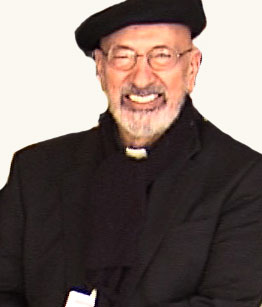 Prayer is assumed as something we know how to do, but do we? The Church has been constantly teaching her children throughout the ages. The Mass, of course, is our central act of prayer. But to truly deepen our prayer, even our worship in the Mass, we must appreciate who God is. God is a Trinity, He revealed Himself to us. He is Three Persons in One God. We experience and express their relationship when we pray “Glory be to the Father, Glory be to the Son,
Prayer is assumed as something we know how to do, but do we? The Church has been constantly teaching her children throughout the ages. The Mass, of course, is our central act of prayer. But to truly deepen our prayer, even our worship in the Mass, we must appreciate who God is. God is a Trinity, He revealed Himself to us. He is Three Persons in One God. We experience and express their relationship when we pray “Glory be to the Father, Glory be to the Son, 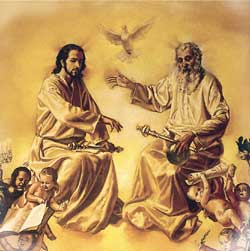 Glory be the Holy Spirit, as it was in the beginning, is now and ever shall be world without end”. When we pray “Glory be to the Father”, He really hears us…He is present, He is truly with you. What does that mean when we pray? It is a relationship. The same is true in relation to the Son and the Holy Spirit. Msgr. Esseff, in this first lesson on prayer, breaks this open in a very deep and important way…the importance of Trinity and presence. Msgr. Esseff also begins an introduction to the importance of the Liturgy of the Hours and the Psalms.
Glory be the Holy Spirit, as it was in the beginning, is now and ever shall be world without end”. When we pray “Glory be to the Father”, He really hears us…He is present, He is truly with you. What does that mean when we pray? It is a relationship. The same is true in relation to the Son and the Holy Spirit. Msgr. Esseff, in this first lesson on prayer, breaks this open in a very deep and important way…the importance of Trinity and presence. Msgr. Esseff also begins an introduction to the importance of the Liturgy of the Hours and the Psalms.
Be sure to visit Msgr. Esseff’s website: “Building A Kingdom of Love”

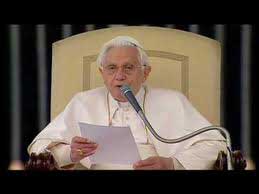

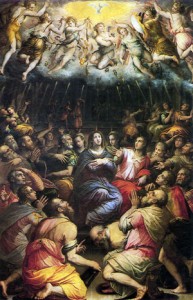 “Venerating the Mother of Jesus in the Church means, then, learning from her how to become a community of prayer“, the Holy Father added. “This is one of the essential aspects of the first description of the Christian community given in the Acts of the Apostles”.
“Venerating the Mother of Jesus in the Church means, then, learning from her how to become a community of prayer“, the Holy Father added. “This is one of the essential aspects of the first description of the Christian community given in the Acts of the Apostles”.